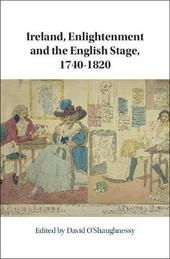
|
Ireland, Enlightenment and the English Stage, 1740-1820
Hardback
Main Details
| Title |
Ireland, Enlightenment and the English Stage, 1740-1820
|
| Authors and Contributors |
Edited by David O'Shaughnessy
|
| Physical Properties |
| Format:Hardback | | Pages:282 | | Dimensions(mm): Height 235,Width 158 |
|
| Category/Genre | Drama
Literary studies - c 1500 to c 1800
Literary studies - plays and playwrights |
|---|
| ISBN/Barcode |
9781108498142
|
| Classifications | Dewey:792.09415090 |
|---|
| Audience | | Professional & Vocational | |
|---|
| Illustrations |
Worked examples or Exercises; 5 Tables, black and white; 21 Halftones, black and white
|
|
Publishing Details |
| Publisher |
Cambridge University Press
|
| Imprint |
Cambridge University Press
|
| Publication Date |
1 August 2019 |
| Publication Country |
United Kingdom
|
Description
The theatre was a crucial forum for the representation of Irish civility and culture for the eighteenth-century English audience. Irish actors and playwrights, operating both as individuals and within networks, were remarkably popular and potent during this period, especially in London. As ideas of Enlightenment percolated throughout Britain and Ireland, Irish theatrical practitioners - actors, managers, playwrights, critics and journalists - exploited a growing receptivity to Irish civility, and advanced a patriot agenda of political and economic autonomy. Mobility, toleration and the capacity to negotiate multiple allegiances are marked features of this Irish theatrical Enlightenment, whose ambitious participants saw little conflict between their twin loyalties to the Crown and to Ireland. This collection of essays responds to recent work in the areas of eighteenth-century theatre studies, Irish studies and Enlightenment studies. The volume's discussions of genre, colonialism, gender, race, music, slavery, and dress open up new avenues of scholarship and research across disciplines.
Author Biography
David O'Shaughnessy is Associate Professor of English at Trinity College Dublin. He has published widely on eighteenth-century theatre studies, including William Godwin and the Theatre (2010). Most recently, he edited 'Networks of Aspiration: The London Irish of the Eighteenth Century' which was a special issue of the journal Eighteenth-Century Life and co-edited The Letters of Oliver Goldsmith (2018).
Reviews'Ireland, Enlightenment and the English Stage makes a bold and necessary intervention in the field. Its essays shed important new light on the dynamic contribution to English theatrical culture made by a multitude of Irish practitioners and also productively challenge the foundations of what we take 'the Enlightenment' to be in relation to ideas of nation, cosmopolitanism, and cultural production.' David Taylor, University of Oxford Burke's essay ... strikes a note that synthesizes the volume. Theater, she writes, becomes a crucial vehicle for the spread of Enlightenment as it enables 'a broadening of horizons [that] did not require a jettisoning of the past'. In this volume, whose essays consistently pair careful historicist research with innovative thought, O'Shaughnessy and his fellow contributors exemplify this achievement for current scholarship as well.' Emily Hodgson Anderson, Review 19 'Reconstructing and analysing the world of eighteenth-century theatre moreover demands research that extends beyond literary texts and is attentive to the contexts and the meanings of performance, and the different ways in which both text and performance were mediated and remediated in the period. The essays in this impressive collection not only navigate these challenges, they showcase an impressive sophistication in both the methods and approach employed, and in their nuanced conceptualization of the issues of identity on which the collection is focused ... This superb collection makes an important intervention in a number of different fields and should be considered essential reading for scholars of eighteenth-century Ireland across a range of disciplines, as well as for critics and historians of theatre in the long eighteenth century.' Cliona O Gallchoir, Eighteenth-Century Ireland
|